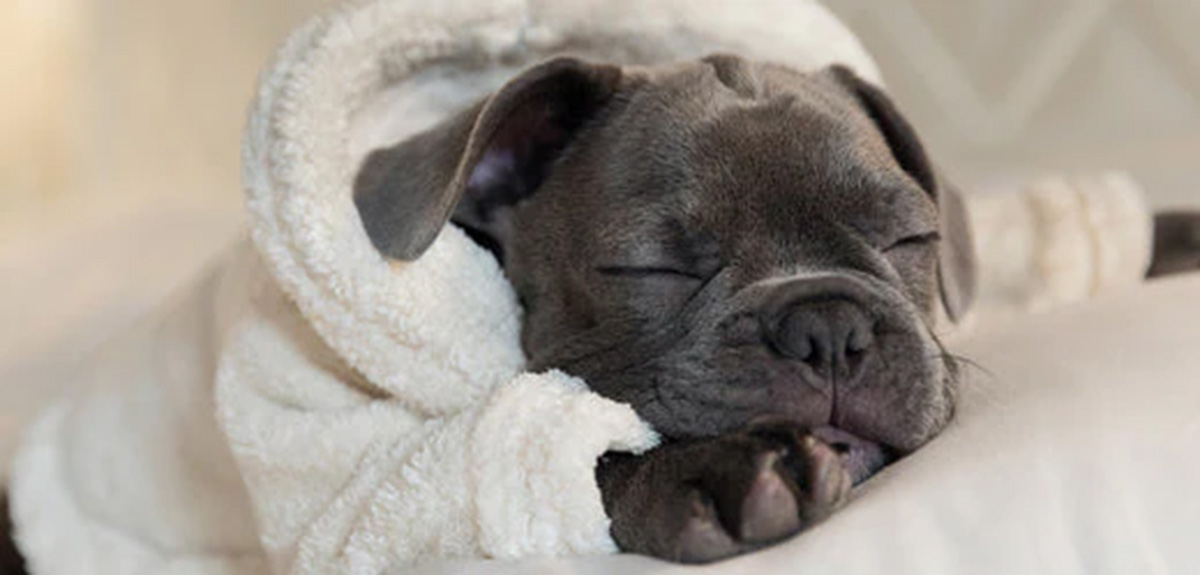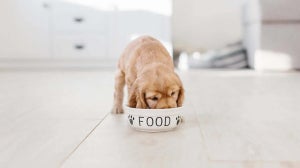
How often should a puppy poop? Toilet training puppies takes time and patience, but it also helps you build an important bond for life and sets up the foundation for the rest of your puppy training together. Dogs thrive when they have a structured routine and toilet training is one of the first routines you must establish. Many new owners wonder how to establish the best toilet routine to avoid accidents around the home. In this article, we will cover all the bathroom routine basics to get you off to a flying start with your new puppy.
Understanding your puppy’s bathroom needs
How often do puppies need to pee? Understanding and anticipating your puppy’s toileting needs is the best foundation for toilet training and patience is also key! Establishing a clear understanding of your puppy’s preferences and needs is the first step. Puppies prefer a clean area to poop that has a familiar smell. They may also prefer certain surfaces over others, e.g., grass. Signs that your puppy needs to go to the toilet include barking, scratching at the door, circling the room, squatting, restlessness, and sniffing. But when they first come home at 10 weeks old, these signs can be hard to spot, as very young puppies haven’t learned the sensation yet, so the action can happen very quickly. Failure to act on these signals can result in accidents! If an accident does happen, make sure not to scold your puppy; just ignore them completely—removing attention is the best way to communicate that the action was not desirable. When they do go in the right place, immediately lavish them with praise. Don’t forget to reward them with their favourite treat or toy after they successfully go to the toilet in your established toilet area.
How often should a puppy poop?
How often a puppy should poop depends on their age, size and diet!
How often do dogs poop on average? After one year of age, dogs generally defecate 1-3 times a day. Puppies need to go more often, which is another reason why understanding your puppy’s toileting needs is vital.
2–10 weeks: Puppies may poop after every meal
3 months: Puppies may poop up to four times a day
6 months: Puppies may poop up to three times a day
1 year +: Most dogs poop one to three times a day
How often should a puppy pee?
Puppies have poor control over their small bladder until they are around 12 months of age and will need to urinate much more frequently than adult dogs. How often a puppy should pee will be dependent on their age. Most puppies will be welcomed into their new homes at around 10 weeks old, and therefore should be taken to pee every 2-3 hours. At 4-6 months of age, your puppy will start to have more control over their bladder and may even start to sleep through the night! You should still aim to take your pet out to urinate 3-5 times a day, depending on their needs.
Actions stimulate pups to wee; being aware of these triggers and pre-empting them will ensure successful toilet training. Always remember to take them outside at routine intervals. Pop them out on the grass when they wake up from a nap, after eating, drinking, playing a game or when you notice they are showing signs they may be finding somewhere to go pee.
2 months old: Every 2–3 hours
3 months old: Every 3–4 hours
4 months old: Every 4–5 hours
6 months old: 3 - 5 times a day
How often do dogs need to pee? Dogs will naturally need to pee several times a day.
Recognizing potty signals
Barking: Puppies and dogs will try to get your attention by barking! Barking at the door is a key signal that your pet needs to go to the toilet as soon as possible.
Restlessness/Circling/Sniffing: If your dog is circling a room, looking restless, sniffing around and/or squatting, it's a sure sign they need to be taken out.
Whining: If your dog is making a whining sound to get your attention, this may also mean they need to go to the toilet.
Looking/Scratching: If your dog is looking outside, scratching at the door or at the area they usually go to the toilet, this is also their way of letting you know that they need to go to the toilet as soon as possible.
Why a bathroom routine matters
Establishing a strong toilet routine with your puppy or dog can take time and patience, however it is beneficial for everyone involved! You should never punish your puppy if they have accidents, as this can make your puppy distrustful of you and make toilet training even more difficult. It is a team effort and your pet will not understand why you are scolding them. Establishing a strong toilet routine with your pet will reduce the likelihood of accidents around your house, strengthen your bond and make other types of training easier, as your pet will trust you more. We like to say, a happy puppy makes a happy home!
How can I establish a healthy bathroom routine for my puppy?
Understand your puppy’s toilet cues! Your pet will let you know when they need to go in their own way. Be vigilant for barking, circling, whining, staring at the toilet area, scratching, squatting, sniffing and restlessness. These are all signs that your puppy needs to go to the toilet.
Have patience and do not punish your pet if they have accidents around the home. Punishing them can make your puppy distrustful of you and make toilet training even more difficult in the long run.
Have a regular toilet routine. Be aware of how often puppies need to urinate and poop based on their age, as this routine will need to adapt as they grow. For example, a 3 month old puppy may poop up to four times a day and they will need to pee every 3-4 hours. Take them out at regular intervals after meals, naps and playtime.
Make sure to maintain a regular feeding schedule, as this will also determine their toilet needs and keep it consistent!
Pick a toilet spot and stick to it! Puppies prefer a clean area to poop which has a familiar smell. They may also prefer certain surfaces over others, e.g., grass. Consistency is key and you need to anticipate their needs and take them out regularly. Lastly, remember to reward them with their favourite treat after they successfully go to the toilet in your established toilet area. Lots of verbal praise helps, too!
Essential supplies for a healthy bathroom routine
Not sure what items are essential for toilet training your puppy? The checklist below covers all the essential supplies for a healthy toilet routine. This list will leave you well prepared, regardless of how often your puppy poops.
Puppy pads or disposable fresh grass patches: These will help you alleviate any accidents happening around the home.
Dog bags: A poop essential. We recommend using eco bags that are kinder to the environment.
Enzyme based cleaner: An enzyme cleaner is the best way to remove stubborn stains and scents around the home after toilet accidents.
Treats: Reward your puppy or dog with their favourite treat when they follow the correct toilet routine to encourage them to stick to it - praise them too!
Crates: If you want to speed up the training process and make it more effective, crate training can be a great solution. Dogs will avoid going to the toilet where they sleep, so they will try and alert you that they need the toilet rather than going inside. When choosing your crate, opt for one small enough that the puppy doesn’t have enough room to wee in the corner of the crate but large enough for them to sleep comfortably.
Conclusion
No matter how often your puppy poops, establishing a strong toilet routine early with your puppy or dog is key to a healthy, happy pet and a clean home. Be patient and work with your pet to initiate a regular toilet routine. Research how often your dog or puppy should need to go to the toilet and work with their schedule. Keep feeding times regular and always be aware of the signs that your dog is trying to tell you they need to go! Use praise and treats to encourage them to follow the routine. This will also discourage them from having accidents around the home. Don’t forget to stock up on all the essentials beforehand, such as dog bags and puppy pads.









